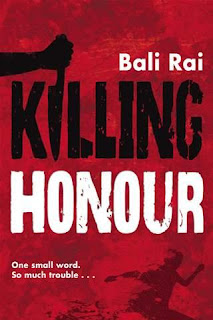Bali Rai is considered the writer of British Asian teen fiction, and it’s not hard to see why. Life bursts off the pages of his 2011 novel, Killing Honour. Rai tackles taboo subjects with incredible clarity and passion.
Killing Honour tells the story of Sat, a Leicester-born Asian teenager, whose sister is forced into a marriage with an abusive husband who then goes onto murder her – a so-called “honour killing.” Bai makes his stance clear on these killings in the title of the book and through the voice of his narrator, who never once gives up on his sister, no matter what izzat she has offended. Sat understands that family must come before honour, saying: “[A]ll you’re doing is killing it – killing honour – not defending it,” (KH p.180) but in order to unravel the mystery of his missing sister, Sat comes up against a “wall of silence” in the Sikh community. At the same time, of course, Sat represents those Sikh men who openly condemn such murders.
Killing Honour condemns domestic violence in any form, whether that be against Asian women or white women. By removing the “honour” from the phrase honour killings, Rai exposes these violent acts for what they are: murder without justification. Rai makes it clear how intolerable it can be for women who have to live up to unachievable standards to protect their family’s izzat. Sat notes that he is a male and so the “izzat thing” (KH p91) is easier for him, making his sympathy for women apparent, wishing that his sister had run away, because he could never have lived her life. Rai further instils a sense of sympathy for women by switching the point of view of his narration – sometimes it’s Sat, sometimes it’s third person from Laura’s perspective, and sometimes it’s the abused woman. Here we see the horror of domestic violence and murder from every perspective, from the family to the Asian wife to the abused white girlfriend. Rai considers all these people as victims of the same crime. Rather than privileging one over the other, he states emphatically that it is wrong. That it must be stopped.
Rai paints Leicestershire as a diaspora space – that is a community in which the consciousness of not only the first generation immigrants is transformed, but the indigenous peoples too, each changing and shaping one another together as one cohesive whole. Location figures heavily in Killing Honour, set in and around Leicester, with local landmarks such as De Montfort Hall, Victoria Park, Queens Road, and even Babella’s bar. Sat says that his sister “lived on the other side of Leicester, but it wasn’t far. Nothing in Leicester is.” (KH p.9) And this image of Leicester as a tightknit community can be felt not only in the novel, but in the city itself, with art reflecting reality and vice versa.
In Rai’s novel, Britishness figures as intrinsically culturally diverse. As Rai himself says, “we should celebrate what we have in common” rather than putting our differences first. And so we see Sat drinking from a Bart Simpson mug, the family visiting Disney World and hot dogs being eaten. When Sat gets a girlfriend who is white (a union frowned upon by people from both sides of the cultural divide), he is presented as very much the modern multiculturalist, showing the transformations that have taken place between first and second generations in the diaspora space of Leicester life. Sat says of his girlfriend: “Although we were both British, Charlotte came from one culture and I was from another. We were like the same, and then different too.” (KH, p38)
But this is no glib celebration of multi-racial Britain. We see several examples of racism, far right activism and inter-communal strife. Most notably, we see hatred between Muslims and Sikhs, which Sat puts down to “prejudice” more than “any sense of tradition.” (KH p74) Non-white communities clash on their own terms, while Sat’s own Sikh community clashes with white bigotry, too. We hear an anecdote of his father being mistaken for a terrorist whilst going through customs, racist slurs of “paki wanker” (KH p40) and several declarations of “you don’t understand our community” (KH p115). Perhaps this is what all the tension in Killing Honour comes down to: understanding. Rai counterbalances this sense of violence and distrust between factions with genuine friendships, interracial love and the day to day entanglements that are a staple of multicultural life in Britain.
Bali Rai’s previous works have been celebrated as “verbal brilliance ... on every page” (TES) and Killing Honour is no exception. Each character has her/his distinctive voice, but more than this: their voices ring true. Rai’s ability to capture teenage speech is astonishing and at times, extremely funny, as you hear the voices of Leicestershire locals echoing through the pages, with their “innits” and their “bruvs.”
Killing Honour is a beautifully written, heartfelt book with a genuine and sincere message. Rai is a true inspiration for Leicestershire writers and readers alike, and takes the tradition of Young Adult Leicestershire writing from [Sue] Townsend and into the 21st century.
*Sarah O’Rourke is a volunteer at Grassroutes: Contemporary Leicestershire Writing, a project that aims to promote Leicestershire's diverse literary culture.
Related books:
,,
Related articles:
- Bali Rai, Writers' Gallery, Grassroutes: Contemporary Leicestershire Writing
- Want to Write? – Interview with Booktrust Writer-in-Residence Bali Rai, by Marése O'Sullivan, A Younger Theatre, April 5, 2012
- Bali Rai - reggae, ex-gangsters and zombie-demon-cowboys, by Rachael Mott, The Jitty, May 22, 2011
- Interview with Bali Rai author of Killing Honour, by cari3232, Sugarscape, June 9, 2011


No comments:
Post a Comment